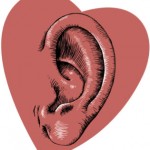A great children’s song starts with the words, “I have two eyes to see with, two hands to wave with, and two ears to hear with.”
I have one objection. In my experience, we may hear sounds with our ears. But we hear people with our hearts.
Martin Buber, the great Jewish philosopher of the twentieth century, illustrates this truth in a story he told about himself.
Listening For The Unspoken
Buber was a young university professor, in the midst of his studies, when a young student knocked on his office door. The student looked troubled. He asked Buber if he could speak with him for a few minutes.
Buber grudgingly agreed, with a clear signal of impatience. He nodded as the student talked, though it was clear his mind was on other things. When the student finished speaking, Buber shared some thoughts and reflections, and then got up and wished the student well.
That evening Buber realized something. He had not been fully present with the student. He listened with his ears but not his heart. Later he learned that the student had taken his own life.
Are you there?
We often fail to be fully present. How often do we talk with our friends and family and listen only for what we want to hear? How many times are we seeming to listen to someone when we are really thinking about where we are going for dinner later? How many of us have talked on the phone and read e-mail at the same time?
To listen attentively is to be truly present, and it can be a struggle. It often depends more on one’s heart rather than one’s ears.
A Burning Bush
The Jewish sages teach this truth in a story about the burning bush. This was the bush covered in flames but not consumed by the fire. Many people, the sages said, walk by that bush. And the God’s voice spoke out continuously from it.
It was only Moses, however, who had the heart to stop and hear it. As one rabbi put, “the miracle was not that God called out to Moses from a burning bush. The miracle was that Moses heard Him.” So may we.


